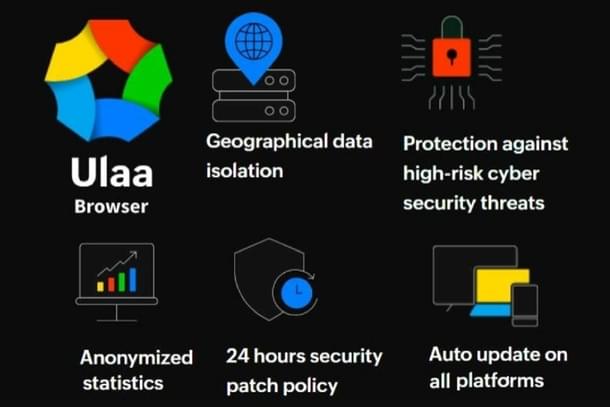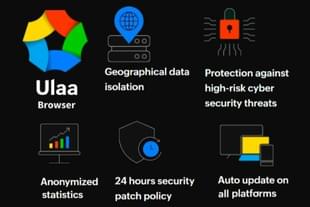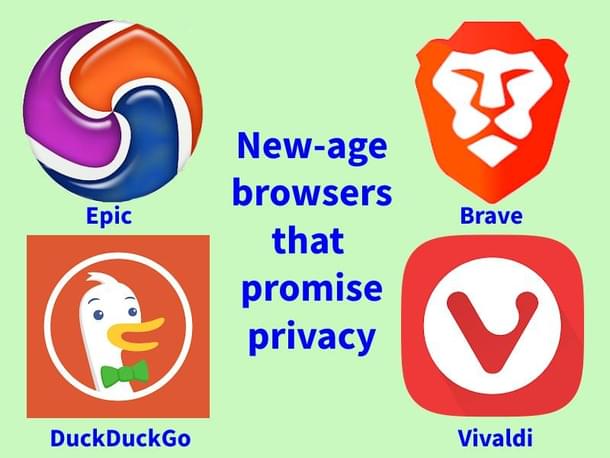Technology
Zoho’s Ulaa Joins A Small Club Of Independent Web Browsers That Prioritise Privacy
Anand Parthasarathy
May 10, 2023, 03:59 PM | Updated 03:58 PM IST
Save & read from anywhere!
Bookmark stories for easy access on any device or the Swarajya app.


The unveiling last week of a web browser by Zoho, the Chennai-headquartered international provider of business software solutions, is noteworthy for more than one reason.
In the fiercely competitive arena of Internet browsers for mobile and desktop devices, it is perhaps, a rare (but not the only) Indian entry.
Its key feature and its unique selling proposition or USP (though that may be the wrong term for what is now a free product) revolves around the data that all users of browsers generate — and what those who create and run the browsers, do with it.
Data is the new oil they discovered a few years ago. And the searching and surfing habits of customers using free web apps and tools, has emerged as a rich pocket of profitable data for the providers of these solutions and their business clients.
The first casualty — as the rest of us are discovering to our chagrin — is privacy. Every time we enter a keyword in an Internet search engine, every time we bookmark our favourite websites or make a purchase at an e-commerce portal, we reveal facts about ourselves that someone, somewhere is monitoring — and selling.
The largest conduit for such marketable matrices about us, the users, is the web browser. And the two biggies in the business — Microsoft’s Edge and Google’s Chrome — while feature-rich and very useful in their individual ways, are somewhat like the Godfather: They seem to make you “an offer you can’t refuse”.
The Binge search engine within the Edge browser, now offers a chat option with the Artificial Intelligence-fuelled Chat GPT tool — a powerful value proposition.
But neither of these browsers has a clearly enunciated policy regarding the data they mine from user habits online — and both are suspected to be commercially driven in this respect.
Enter the independent browser, unbeholden to any large Internet entity.
Sensing users’ angst with the knowledge that they are just lucrative commodities for the creators of the so-called ‘free’ web tools they use, these new-age browsers prioritise user privacy over their own profit by offering a slate of tools that prevent tracking of a user’s browsing habits, erase the browsing history and on their part, undertake to ‘anonymise’ any data that may accrue from usage of the browser — rather than tag it to the individual user, to create an ‘identikit’.
Online Privacy, A 'Fundamental Right'
Zoho on its part has enunciated its policy: “We believe that online privacy is a fundamental right, and we do everything in our power to protect it.”
To this end, the Ulaa browser that it launched on 5 May (the launch details can be found in the Swarajya report) makes an explicit commitment to user privacy with a slate of features like resetting all your settings every time you open the browser; anonymising any data that enters the Ulaa server so that it cannot be mapped back to an individual user; geographically localising the information that a user generated to the country where he or she is located; preventing social media apps like Facebook, Twitter, LinkedIn etc from tracking what a user does online; filtering and blocking intrusive ads; auto-updating all the platforms run by a user, be it Windows, MacOs, Linux , iOS or Android, thus providing the latest patches and installing all available security patches within 24 hours.
All these features are not unique to Ulaa, but together they offer a good value proposition.
I also found useful, the feature where users can decide between different flavours of the browser's look and feel, depending on whether they want a work mode, a personal mode, a safe kids’ mode — or want to use the browser for software development.
This brings up the most useful shortcuts for each mode, though you can further personalise it if you choose.
Ulaa is available for download for all popular desktop and mobile operating systems including Android and iOS. The mobile versions state that they are as yet in beta versions — so hopefully some of the user feedback that is seen in comments, may be used to improve the product.
An 'Epic' Indian Entry

While Ulaa is the latest privacy-centric browser, it is not the first Indian product in this space.
That honour goes to the Epic browser, launched in 2013 by Bengaluru and Washington DC (US)-based Alok Bhardwaj through his company, Hidden Reflex. It is the first independent web browser built on Chromium (like Google's Chrome browser). It claims it is always-on "private browsing mode", so on closing Epic, all your browsing data is deleted.
“Epic removes all Google tracking and blocks hundreds of other companies from tracking you. If you turn on Epic's encrypted proxy, you have protection from snooping by hackers, trackers, your ISP, government, and employer as well”, says the maker.
Here are some other new-era browsers that I have used, which have made privacy, their main mantra:
— Vivaldi from Norway, is the brainchild of Jon von Tetzchner, who also co-founded the independent Opera browser. He helped launch Vivaldi in 2016, soon after Opera changed hands and the control went outside Norway. I like Vivaldi for its starkly simple look as well as its limitless ability to be customised by the user. Von Tezchner’s catchphrase was “Do you have the feeling you are being followed? You are!” — and to prevent you from being followed on the Web, he put in place strong privacy and ad-blocking features. The latest version 6 of Vivaldi launched last month has new features like ‘Workspace’ for productivity, social media, news, and shopping etc, and then open related tabs within those workspaces.
— Brave comes from the US and is based on the Chromium operating system, yet claims to be three times faster than the Google avatar of Chromium — Chrome. Is it fast, yes, I think so, though it is difficult to express it in numbers since so many factors, primarily the speed of your Internet service and the number of other users on your Wi-Fi network play a part. I think Brave’s USP is that it is something of an ad killer but that applies only to ads popping up on the sites you visit. Brave has ads it favours — and encourages you to view them in exchange for ‘tokens. Some confusing dogma there!
— DuckDuckGo is not so much browser as a privacy-focussed search engine, but I have included it here because so many other browsers (including Zoho’s Ulaa) offer it as the default search engine, since its commitment to privacy dovetails that that of the browser. You can add DuckDuckGo’s private search engine as a free extension to your existing Chrome browser and enjoy the best of both worlds!
So there — you have a choice of browsers which claim to put your interests and right to privacy first, before those of the Internet industry. Each has some special features.
But privacy in the age of Internet is as yet, a minority concern for those who provide those attractive, free apps. And for independent developers, it’s still a challenging work in progress.
Anand Parthasarathy is managing director at Online India Tech Pvt Ltd and a veteran IT journalist who has written about the Indian technology landscape for more than 15 years for The Hindu.





